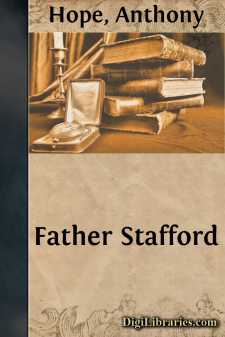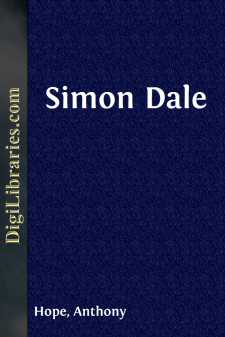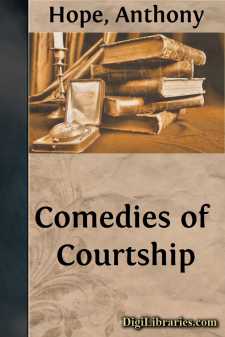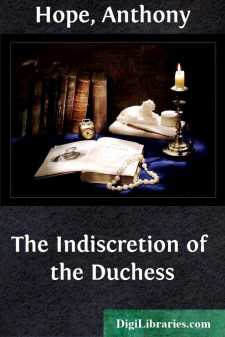Categories
- Antiques & Collectibles 13
- Architecture 36
- Art 48
- Bibles 22
- Biography & Autobiography 813
- Body, Mind & Spirit 142
- Business & Economics 28
- Children's Books 17
- Children's Fiction 14
- Computers 4
- Cooking 94
- Crafts & Hobbies 4
- Drama 346
- Education 46
- Family & Relationships 57
- Fiction 11829
- Games 19
- Gardening 17
- Health & Fitness 34
- History 1377
- House & Home 1
- Humor 147
- Juvenile Fiction 1873
- Juvenile Nonfiction 202
- Language Arts & Disciplines 88
- Law 16
- Literary Collections 686
- Literary Criticism 179
- Mathematics 13
- Medical 41
- Music 40
- Nature 179
- Non-Classifiable 1768
- Performing Arts 7
- Periodicals 1453
- Philosophy 64
- Photography 2
- Poetry 896
- Political Science 203
- Psychology 42
- Reference 154
- Religion 513
- Science 126
- Self-Help 84
- Social Science 81
- Sports & Recreation 34
- Study Aids 3
- Technology & Engineering 59
- Transportation 23
- Travel 463
- True Crime 29
Anthony Hope
Anthony Hope, born Anthony Hope Hawkins on February 9, 1863, was an English novelist and playwright best known for his adventure novel "The Prisoner of Zenda" (1894). The novel's success led to numerous adaptations and cemented Hope's place in literary history. Besides his notable works of fiction, Hope was also a barrister and had a brief political career before dedicating himself fully to writing.
Author's Books:
Sort by:
by:
Anthony Hope
Eugene Lane and his Guests. The world considered Eugene Lane a very fortunate young man; and if youth, health, social reputation, a seat in Parliament, a large income, and finally the promised hand of an acknowledged beauty can make a man happy, the world was right. It is true that Sir Roderick Ayre had been heard to pity the poor chap on the ground that his father had begun life in the workhouse; but...
more...
by:
Anthony Hope
CHAPTER I THE CHILD OF PROPHECY One who was in his day a person of great place and consideration, and has left a name which future generations shall surely repeat so long as the world may last, found no better rule for a man's life than that he should incline his mind to move in Charity, rest in Providence, and turn upon the poles of Truth. This condition, says he, is Heaven upon Earth; and...
more...
by:
Anthony Hope
CHAPTER I THE VIRTUOUS HYPOCRITES AT first sight they had as little reason for being unhappy as it is possible to have in a world half full of sorrow. They were young and healthy; half a dozen times they had each declared the other more than common good-looking; they both had, and never knew what it was not to have, money enough for comfort and, in addition that divine little superfluity wherefrom joys...
more...
by:
Anthony Hope
DICK BENYON'S OUTSIDER. A shrunken sallow old lady, dressed in rusty ill-shaped black and adorned with an evidently false 'front' of fair hair, sat in a tiny flat whose windows overlooked Hyde Park from south to north. She was listening to a tall loose-built dark young man who walked restlessly about the little room as he jerked out his thoughts and challenged the expression of hers. She...
more...
by:
Anthony Hope
Chapter I. A Multitude of Good Reasons. In accordance with many most excellent precedents, I might begin by claiming the sympathy due to an orphan alone in the world. I might even summon my unguided childhood and the absence of parental training to excuse my faults and extenuate my indiscretions. But the sympathy which I should thus gain would be achieved, I fear, by something very like false...
more...
by:
Anthony Hope
CHAPTER I. A PIOUS HYPERBOLE. Before my coronation there was no event in childhood that impressed itself on my memory with marked or singular distinction. My father's death, the result of a chill contracted during a hunting excursion, meant no more to me than a week of rooms gloomy and games forbidden; the decease of King Augustin, my uncle, appeared at the first instant of even less importance. I...
more...
by:
Anthony Hope
A LIBERAL EDUCATION "There's ingratitude for you!" Miss Dolly Foster exclaimed suddenly. "Where!" I asked, rousing myself from meditation. She pointed to a young man who had just passed where we sat. He was dressed very smartly, and was walking with a lady attired in the height of the fashion. "I made that man," said Dolly, "and now he cuts me dead before the whole of...
more...
by:
Anthony Hope
CHAPTER 1 The Rassendylls—With a Word on the Elphbergs "I wonder when in the world you're going to do anything, Rudolf?" said my brother's wife. "My dear Rose," I answered, laying down my egg-spoon, "why in the world should I do anything? My position is a comfortable one. I have an income nearly sufficient for my wants (no one's income is ever quite sufficient, you...
more...
by:
Anthony Hope
A Suppressed Passage Mr Jenkinson Neeld was an elderly man of comfortable private means; he had chambers in Pall Mall, close to the Imperium Club, and his short stoutish figure, topped by a chubby spectacled face, might be seen entering that dignified establishment every day at lunch time, and also at the hour of dinner on the evenings when he had no invitation elsewhere. He had once practised at the...
more...
by:
Anthony Hope
CHAPTER I DOCTOR MARY'S PAYING GUEST "Just in time, wasn't it?" asked Mary Arkroyd. "Two days before theвÐâthe ceremony! Mercifully it had all been kept very quiet, because it was only three months since poor Gilly was killed. I forget whether you ever met Gilly? My half-brother, you know?" "Only onceвÐâin Collingham Gardens. He had an exeat, and...
more...











